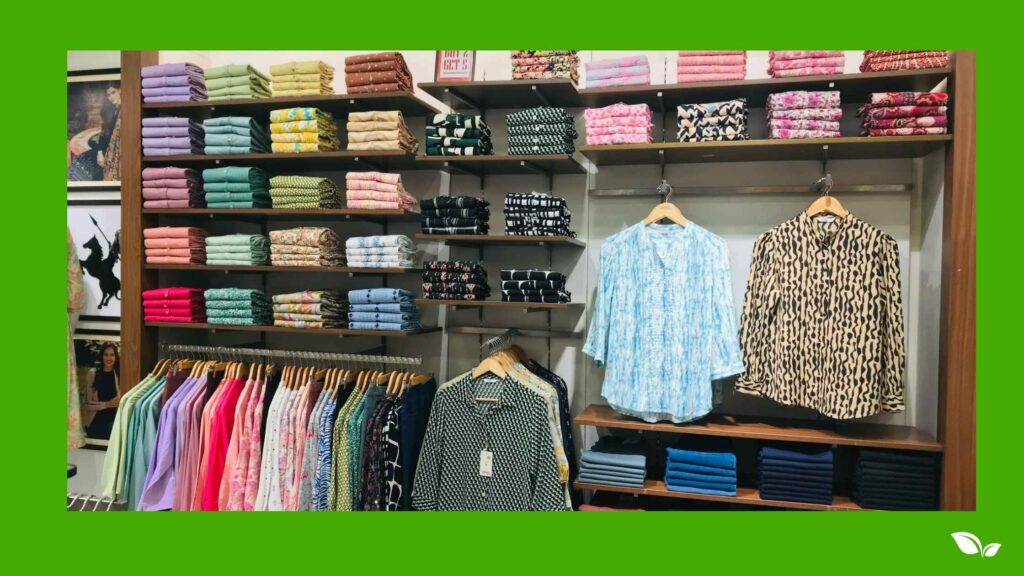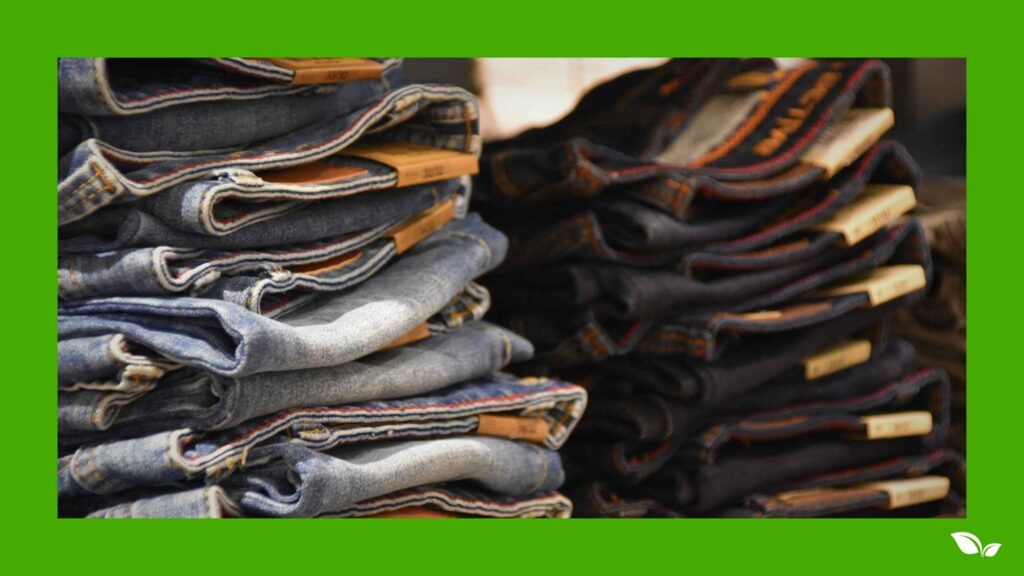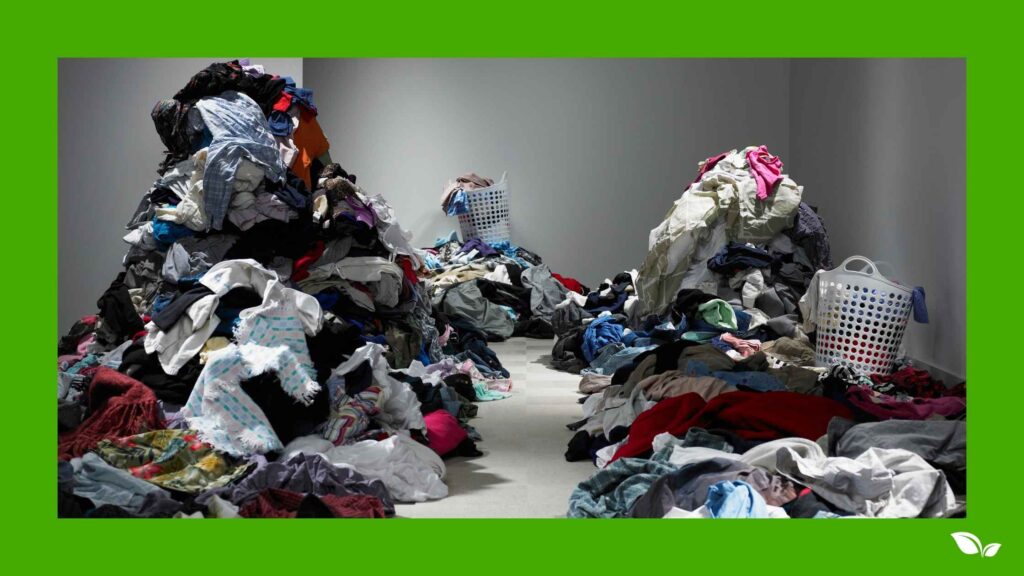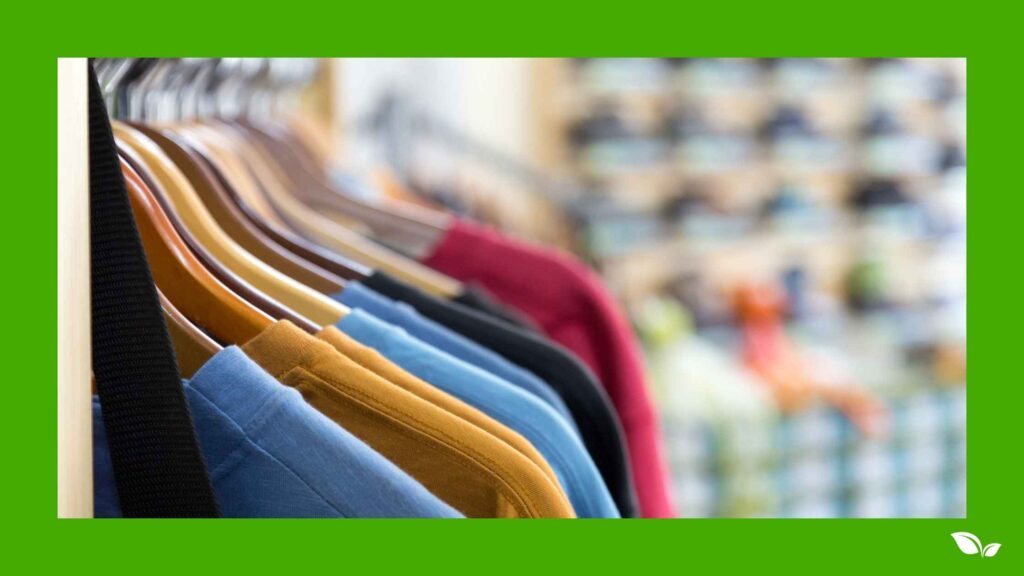Retail waste is any waste generated by businesses involved in retail.
This can include any waste stream, but normally refers to the 4 main types of waste, which are general waste, dry mixed recycling, food waste, and glass waste.
Retail waste is produced as an inevitable result of daily activities.
It is essential that retailers minimise their waste as much as possible to reduce their impact on the environment and reduce their operational cost.

1. What is Retail Waste?
Retail waste refers to the various types of waste generated by businesses and establishments involved in retail operations.
Retail waste refers to any type of waste that is generated by retail businesses, like high street clothing shops, electronic stores, grocery stores and supermarkets, bookstores and furniture shops and much more.
Retail waste can encompass a wide range of materials and items produced as a result of the specific shop’s daily activities.
Some common examples of retail waste include:
1. General Waste
The types of commercial general waste that retail shops may produce include:
- Non-recyclable waste from packaging
- Non-recyclable plastic shopping bags
- Non-recyclable paper (e.g. receipts, posters, brochures).
- Broken and damaged merchandise
- Expired or unsold inventory that is non-recyclable.
- Damaged store fixtures and fittings
2. Recyclable Waste
Recyclable waste for retailers could include the following:
- Cardboard & paper from packaging and promotional materials
- Plastic packaging from bottles, containers etc.
- Glass containers from beverages and storage containers
- Tin cans from food and drink storage
- Recyclable bags made from paper or plastic
- Clothing and textile waste
3. Food Waste
Retailers can produce huge amounts of food waste, particularly those that specialise in selling food-related produce such as greengrocers and supermarkets etc.
Food waste typically is caused by the following reasons:
- By-products (food waste generated by preparing food such as fruit and vegetable peels, coffee grounds)
- Expired/ spoiled food
- Leftovers (any food left on the plate after a meal is finished)
- Overproduction/ unsold produce
- Ruined food (e.g. burnt, dropped on the floor)
Some examples that are common for retailers include:
- Unsold fresh produce like fruits, vegetables and herbs
- Expired food packages like microwave meals, meal deal components etc.
- Unsold bakery and deli items that have short sell-by dates
- Expired meat and seafood
- Spoiled dairy products like yoghurt, cheese, or milk
- Overproduction of salad bar food such as dressings, pre-made salad options like chopped lettuce, coleslaw, potato salad etc.
Food waste can also come from stores that don’t sell food from any offices or staff rooms where employees consume food on the premises.
4. Glass Waste
Retailers contribute to a significant portion of glass waste through various means:
- Glass bottles and jars from food product and beverages, or storage containers for various products
- Merchandise display units
- Lighting fixtures (with electrical components removed)
- Broken fragile items such as glassware, ornaments and homeware
- Returned or damaged glass products
- Damaged furniture and decor like glass tables, TV units or vases
- Broken cosmetic items such as perfume bottles, colognes, skincare items
5. Cardboard and Paper Waste
Retailers often handle a lot of cardboard so it can make sense to have a separate bin for this as opposed to filling up your dry mixed recycling bin with it, this can be cheaper in the long run.
Cardboard waste typically arises due to:
- Packaging and shipping materials
- Unused display or promotional materials
- Flattened boxes and packaging from unpacking stock
While cardboard is one of the most recyclable materials, the key is to keep it dry, clean, and separate from general waste to avoid landfill and maximise value.
6. Sanitary Waste
Even though it’s not the glamorous part of retail operations, sanitary waste management is essential for health, comfort, and legal peace of mind.
Sanitary waste includes items such as:
- Feminine hygiene products (tampons, pads)
- Nappies and incontinence items
- Tissues, wipes, and other personal hygiene disposables
You’ll often find this kind of waste in staff and customer toilets or nursing areas.
Why it matters:
- It’s not classed as hazardous, but it can carry bacteria and cause hygiene risks if not handled correctly
- Regulations (like the UK Workplace Health & Safety rules) require businesses to provide discreet, regularly emptied sanitary bins in such facilities
- Using dedicated bins, maintaining privacy, and ensuring regular collection helps prevent unpleasant smells, support dignity, and avoid compliance issues
7. Confidential Waste
Sensitive documents from staff records to customer information demand secure disposal.
Typically includes:
- Personal records and HR files
- Customer or transaction forms with contact details
- Financial documents, receipts, and invoices
These are common in the administration side of retail businesses. Retailers often partner with shredding or secure waste services to ensure documents are rendered unreadable before disposal or recycling. This protects privacy, helps meet GDPR requirements, and preserves trust.
8. Pest Control
Waste management isn’t just about disposal; it’s also about cleanliness and preventing unwanted pests.
Pest-related waste concerns usually stem from:
- Accumulated food scraps or improperly sealed waste bins
- Leftover perishables, especially near bin areas
- Overflowing or infrequently cleaned waste containers
- Food waste discarded in open bins
Examples you may see in retail settings:
- Spilled waste near bins or overflowing bins
- Dirty bins that have not been regularly cleaned
To stay pest-free, keep bins tightly closed, clean and disinfect collection areas regularly, and partner with reliable pest control services who can provide on-going preventative support.

2.Why is Proper Retail Waste Disposal Important?
Efficiently managing waste disposal in your shop with separate bins can lead to significant cost savings.
The costs associated with waste collection for retailers are impacted by various factors, including the type of waste, the frequency of pickups, the size of bins, and any government-mandated excess weight fees.
By segregating waste into distinct streams, such as food waste, dry mixed recycling or glass waste, you can reduce the weight in your general waste bins or mixed recycling bins and avoid those costly excess weight fees. In addition, legislation in place in England, Scotland and Wales now makes separating waste into these waste streams mandatory.
While investing in additional waste bins may initially seem like an expense, it often proves to be a cost-effective, long-term strategy.
Properly managing your shop’s waste streams can result in substantial cost savings, benefiting both your bottom line, and the environment.
Here’s why it’s crucial that you separate your waste properly:
1. Diverting Waste from Landfills:
In the retail sector, sorting waste into different categories is crucial to reducing the amount of waste destined for landfills, where harmful methane gas becomes a significant concern.
It’s particularly relevant because a substantial portion of global food waste ends up in landfills worsening the problem.
By categorising waste as food waste, dry mixed recycling, glass recycling or any other waste stream, rather than lumping everything into general waste, retail establishments enhance the likelihood of responsible recycling, eco-friendly disposal and ensure they’re compliant with waste laws, therefore avoiding fines or service disruption.
Cardboard
2. Reducing Methane Emissions:
In the retail industry, food waste plays a substantial role in the overall waste generated.
Retailers throw away the equivalent of a whopping 190 million meals every single year.
When food waste ends up in general waste bins, it heads to landfills, decomposes without oxygen, and releases methane – a harmful greenhouse gas.
The solution to combating this is straightforward: introduce separate bins for food waste.
This not only reduces the environmental impact but can also lead to cost savings for retail businesses and allows the waste to be utilised for other purposes e.g. compost or biofuel.
3. Promoting Recycling:
In the retail sector, having a separate bin for dry mixed recycling, such as cardboard, glass, and plastics, promotes good recycling practices.
It helps employees easily understand where they can recycle and ensures the highest chance of successful recycling.
Retail employees prioritise convenience and efficiency, so clearly labelled, easily accessible recycling bins are more likely to be used.
Recycling conserves valuable resources, energy, and contributes to a greener environment – allowing waste to be reused and turned into other products.
4. Compliance with Legislation
Understanding and complying with waste management regulations is incredibly important to ensure your business stays legal and avoids fines and penalties.
The ‘Environmental Act’ which became law in 2021, establishes legally-binding environmental improvement targets for businesses. The legislation applies to all businesses across the UK, including retail stores.
In addition, waste separation legislation that has come into effect over the last few years mandates varying rules for recycling across different regions of the UK. This further enforces retail stores to separate and dispose of waste responsibly.
This means having dedicated bins for specific waste types, such as food, glass, recycling and general waste.
Non-compliance with these regulations can result in significant penalties for your retail business.
In addition, regulations that apply to all industries such as GDPR are vitally important for the data protection of employees and customers. Therefore, securely disposing of confidential paperwork and showing evidence of this when it comes to audits or inspections is vitally important.
While managing waste in retail might initially seem complex, our team at Waste Basics is here to simplify the process for you.
We offer personalised guidance and support, helping you create an efficient waste management plan tailored to your retail establishment’s unique needs.
Don’t delay, get your waste sorted with us today.

3. Maintaining a safe and hygienic environment for employees and customers
In the retail industry, much like other industries people’s safety and welfare is of paramount importance. Therefore, ensuring sufficient sanitary waste disposal is in place is one of the basic legal requirements retail businesses should consider.
In addition, the prevention of pests such as rats, ants, maggots or other type of infestations is essential for both safety and reputation management. Having a pest control service on offer as part of your contract with your waste management provider allows for issues to be handled efficiently with a focus on prevention – allowing you to treat the root cause of the problem rather than reacting after the fact.
UK Shop and Retail Waste Statistics
Did you know that retailers throw away almost 3 million tonnes of food waste every single year?
In a cost-of-living crisis, with costs skyrocketing every day for both the consumer and shop owners, it is imperative that business owners critically evaluate how much waste they are throwing away.
By segregating waste into different waste streams and ensuring that the best waste conservation and recycling initiatives are in place, businesses can aim to reduce their waste and decrease how much money, and resources end up in the bin.
Supermarkets like Waitrose, Marks & Spencer’s, Sainsbury’s, Tesco, Aldi & Lidl have been reported to sell around 437 million plastic bags every single year.
Following the introduction of a plastic bag charge in May 2021, most retailers began selling “bags for life” at the government-mandated minimum cost of 10p, with many now charging 20-30p.
Although these bags have been branded as bags for life and the initiative was put in place to encourage consumers to re-use their shopping bags, Greenpeace reports that more plastic bags are being sold every year with an increase of 7% since 2023 to 2024 alone.
These sturdier bags, made out of thicker plastic, need to be used at least 10 times before they have the same carbon impact as a thin, single use plastic bag; so only improve the carbon footprint of a single use plastic bag if they are used on more than 10 occasions.
Did you know, every tonne of food waste ending up in landfills produces approximately 4.2 tonnes of greenhouse gas emissions annually?
It’s important that businesses review their food waste management plan and ensure they’ve got the proper resources in place to reduce the amount of food waste they contribute to.
In the UK, retailers and shop owners produce 5 million tonnes of packaging waste every year.
This packaging waste can come from the use of disposable containers, cling film (also known as plastic wrap), and packaging materials like cardboard boxes used for various products and goods.
Packaging waste is normally not reusable, so reducing its impact is essential.
Retail waste from packaging can cause environmental harm, waste resources, and increase economic and ecological costs.
What Size Bins are Best for Your Retail Waste?
For retailers, choosing the right waste bin size is a critical decision that will be influenced by different factors.
This will include your waste store capacity, the types of waste your shop generates, and the total waste volume produced.
In shops and retail environments, the most common forms of waste generated is general waste, dry mixed recycling, food waste and glass waste.
Waste Basics provides a selection of bin sizes customised to accommodate the specific waste output of retail stores, ensuring an optimal fit for efficient waste management.
Some retailers may opt for a combination of bin sizes to match their specific waste requirements and available storage space effectively.
Our approach is flexible, ensuring the most effective and efficient retail waste management.
If you’re unsure about the best bin sizes for your store’s waste production, feel free to reach out to our friendly and knowledgeable team.
We’re here to offer expert guidance and assist you in making the right choice.
General Waste
Every retailer is unique, and the volume of general waste your shop will generate can vary significantly, along with available bin space.
Waste Basics provides four clear options to meet your retail store’s general waste needs.
1100L Commercial General Waste Bin:
Our 1100L general waste bin is a popular choice for many retailers due to its generous pre-collection capacity of up to 70kg, accommodating approximately 18 bin bags.
This bin stands at 1.40 meters in height and 1.26 meters in width.
660L Commercial Waste Bin:
The 660L general waste bin is another common option for retail settings throughout the UK, offering a pre-collection capacity of up to 40kg and space for around 12 bin bags.
This bin measures 1.3 meters in height and 1.26 meters in width.
360L Commercial Waste Bin:
Another option is the 360L bin which is often selected for smaller retail businesses where space is limited. It holds around 5-6 bin bags and a maximum weight capacity of 25kg.
This bin is 1.1 metres in height and 0.61 in width.
240L Commercial Waste Bin:
For smaller retail waste management needs, the 240L bin is a practical solution, capable of holding up to 15kg before collection and accommodating approximately 4 bin bags.
This bin is similar in size to a standard household wheelie bin, measuring just 1.08 meters in height and 0.58 meters in width.
Some retail stores use this bin alongside larger ones for extra waste accommodation.
Dry Mixed Recycling
In retail spaces, the volume of dry mixed recycling generated and available bin space can vary.
Waste Basics offers four distinct options to meet your retail store’s dry mixed recycling requirements.
1100L Dry Mixed Recycling Bin
Our 1100L Dry Mixed Recycling bin is a popular choice among our UK-wide customers.
As the largest commercial dry mixed recycling bin, it can accommodate up to 40kg of mixed recycling, which is roughly equivalent to 115 medium-sized cardboard boxes or around 3,300 plastic bottles.
660L Dry Mixed Recycling Bin
The 660L dry mixed recycling bin is another excellent choice for retail stores that generate a moderate amount of recyclable waste.
With a capacity of up to 25kg, it can handle approximately 59 flattened cardboard boxes or about 2,500 plastic bottles.
360L Dry Mixed Recycling Bin
The 360L dry mixed recycling bin is another choice for retail stores that have a smaller amount of recyclable waste.
It has a capacity of 15kg which equates to approximately 32 flattened cardboard boxes or about 1,300 plastic bottles.
240L Dry Mixed Recycling Bin
For retail spaces with limited storage or smaller waste storage areas, our 240L dry mixed recycling bin is an ideal solution.
It can hold up to 10kg of recyclable materials, roughly equivalent to 24 empty cardboard boxes or around 700 plastic bottles.
This bin size is similar to a typical household wheelie bin.
If you’re uncertain about which bin size suits your retail store, don’t hesitate to contact our friendly team.
They’re available to provide assistance without any obligations and help you make the right selection.
Food Waste
At Waste Basics, we are proud to be a broker dedicated to making waste easy and simple to understand.
Our food waste bins have become a highly valued choice among our retail customers, especially since waste legislation has been introduced to mandate the needs to separate it.
These bins have consistently proven to be a cost-effective solution for our clients over the long term, primarily because food waste tends to be much heavier than typical retail waste.
Our 240L food waste bin, despite its compact size, offers remarkable efficiency when it comes to food waste storage.
This bin can comfortably accommodate up to 4 full bags of food waste or the weight equivalent of 100kg, which is roughly the weight of a standard refrigerator or a small piano!
With dimensions matching those of a household wheelie bin (1.08m in height and 0.58m in width), it’s a practical choice ideally suited for retail establishments.
If you have concerns about whether it can meet your retail store’s food waste needs, some of our retail clients opt for multiple food waste bins to ensure they always have ample space for their property’s food waste.
Glass Waste
Our glass recycling bin is thoughtfully crafted to cater to the distinct glass waste needs of retail establishments in the UK.
We recognise that retail stores frequently encounter difficulties when handling their glass recycling, primarily because of constraints in on-site storage and fluctuating demands.
By actively seeking input from our customers, we’ve devised an effective storage solution customised for your retail store’s commercial glass waste.
This solution has been rigorously tested and stands as the optimal choice, guaranteeing a smooth glass recycling process for your retail space.
In the context of retail, glass recycling may initially seem like a significant investment; however, our glass recycling bins consistently prove to be a cost-effective and practical solution for our retail partners in the long term. Plus, it is now required to be compliant with waste regulations in place in Scotland, England and Wales – find out more here.
The cost-effectiveness becomes particularly apparent when compared to the historical alternative options of increasing waste pick-up frequencies or adding more general waste or dry mixed recycling bins.
Glass waste bins provide substantial benefits, especially for retail spaces that generate a considerable volume of glass waste.
This is often the case when retail stores offer beverages like bottled water, soda, or glassware for meetings or corporate events.
Our 240L glass recycling bin is an excellent choice for efficiently managing your retail store’s glass recycling waste.
It can easily accommodate up to 100kg of glass, which is equivalent to the weight of a standard washing machine!
With dimensions similar to those of a household wheelie bin (1.08m in height and 0.58m in width), it offers a practical and space-saving solution for retail establishments.
For retailers the demands for glass waste collection can vary.
To meet the needs of our retail partners, some opt for multiple bins, especially in areas like office kitchens or break spaces where commercial glass waste accumulates.
Even if your retail store has limited storage space, our bin dimensions are well-suited for compact and secure waste storage areas.
Unlike other waste collection providers that may have hidden fees or variable costs, we prioritise transparent pricing.
With us, you’ll always have a clear understanding of the costs associated with your glass recycling services.
Don’t hesitate to get in touch for a no-obligation, quote to discover how we can support efficient glass recycling for your retail space.

4.What Legislation Affects My Retail Waste Collection?
In the retail sector, staying informed about waste collection legislation is vital for businesses to ensure compliance and responsible waste management practices.
Current Legislation for Retail Waste Collection
Existing UK legislation mandates that businesses, including retail stores, with more than 10 employees must minimise waste by preventing, reusing, recycling, or recovering it.
This includes all waste streams, such as food waste, glass waste, dry mixed recyclable waste, and general waste.
In addition, The Separation of Waste (England) Regulations 2025 (also known as Simpler Recycling) states that micro-businesses with less than 10 employees will also need to separate waste streams by 2027. Similar laws apply to businesses in Scotland, Wales and Northern Ireland.
Using dedicated bins for different waste streams allows retail stores to actively contribute to waste reduction and effective recycling practices while benefiting their bottom line.
Get a quote for your retail store’s waste management needs.
If you prefer to speak with a member of our team now, feel free to call us.
The Retail Waste Collection Process
How does retail waste collection work, and what are the next steps?
Check out the simple process below!
- Choose Your Bins – Select the sizes and types you need.
- Arrange Delivery – Bins delivered without extra rental charges.
- Fill Your Bins – Keep waste separated.
- Scheduled Collection – Regular pick-ups based on your venue’s needs.
To get started with your retail waste quote today, don’t hesitate to get in touch.
At Waste Basics, we keep recycling simple, transparent, and affordable. Get your free quote today and see how much you could save.
![buying_retail[1]](https://wastebasics.co.uk/wp-content/uploads/2023/11/buying_retail1-2240x1120.jpg)





